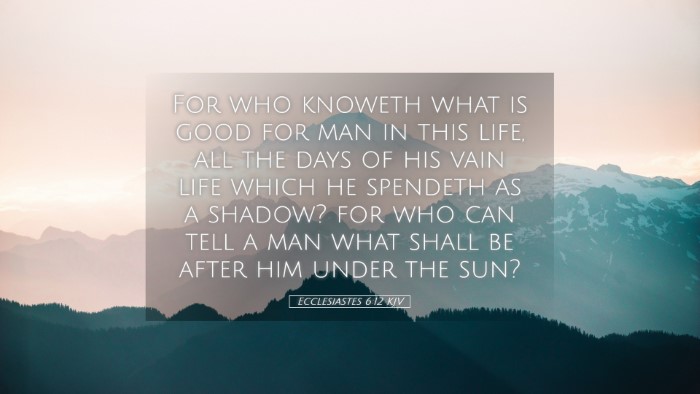Old Testament
Genesis Exodus Leviticus Numbers Deuteronomy Joshua Judges Ruth 1 Samuel 2 Samuel 1 Kings 2 Kings 1 Chronicles 2 Chronicles Ezra Nehemiah Esther Job Psalms Proverbs Ecclesiastes Song of Solomon Isaiah Jeremiah Lamentations Ezekiel Daniel Hosea Joel Amos Obadiah Jonah Micah Nahum Habakkuk Zephaniah Haggai Zechariah MalachiEcclesiastes 6:12
Ecclesiastes 6:12 KJV
For who knoweth what is good for man in this life, all the days of his vain life which he spendeth as a shadow? for who can tell a man what shall be after him under the sun?
Ecclesiastes 6:12 Bible Commentary
Commentary on Ecclesiastes 6:12
Verse: "For who knows what is good for man in life, all the days of his vain life which he spends as a shadow? For who can tell a man what will be after him under the sun?" (Ecclesiastes 6:12, NKJV)
Overview and Context
The Book of Ecclesiastes, traditionally attributed to Solomon, wrestles with the meaning of life and the quest for fulfillment. Here, in Ecclesiastes 6:12, Solomon reflects on the ephemeral nature of human existence and the futility that often accompanies the search for meaning in life. The existential questions posed in this verse resonate deeply within the human spirit, prompting contemplations on the brevity of life and the uncertainty of the future.
Insights from Commentaries
Matthew Henry's Commentary
Matthew Henry highlights the profound melancholy contained within this verse. He notes that it reflects the "vanity of life," suggesting that life is often spent pursuing goals that ultimately seem meaningless. He points out the following key aspects:
- The Ignorance of Humanity: Henry states that humans possess a limited understanding of what is genuinely good for them. This ignorance is the basis of many erroneous pursuits and decisions throughout life.
- The Vanity of Life: He emphasizes that a person's days are spent as a shadow, implying that they are fleeting and insubstantial. The actions and ambitions of life often lack lasting significance.
- The Uncertainty of the Future: The commentary underscores the inability to foresee what will happen after one’s lifetime, indicating that the preoccupations of the present may fade into oblivion after death.
Albert Barnes' Notes on the Bible
Albert Barnes takes a similarly sobering approach to the verse, stressing the limitations of human knowledge concerning life’s purpose and the afterlife. Key insights from Barnes include:
- The Search for Meaning: Barnes notes that Solomon’s question reflects a deep existential inquiry into what is truly beneficial during one’s life—an inquiry that often leads to a recognition of life’s fleeting nature.
- The Nature of Life's Pursuits: He stresses that while individuals chase many things for satisfaction, often they are left empty and unfulfilled due to the temporality of these pursuits.
- A Call to Reflection: He implies that a more reflective and intentional approach to life—one that seeks wisdom from God—might yield greater satisfaction than mere material or temporal achievements.
Adam Clarke's Commentary
Adam Clarke provides a thorough examination of this verse, grounding it in its literary and theological context. He emphasizes the following points:
- Human Limitations: Clarke expresses that the verse highlights the profound limitations of human understanding and perspective. There is a recognition that only God possesses ultimate knowledge regarding what is beneficial for humanity.
- Cultural Reflection: He posts that this statement also reflects the cultural values of Solomon’s time, where people's efforts were often directed toward transient gains without regard for the eternal implications.
- A Divine Perspective: Clarke urges readers to adopt a divine perspective on life’s purpose, suggesting that the knowledge of God offers the true understanding of what is good and lasting.
Theological Implications
This verse raises significant theological questions regarding the nature of life, human purpose, and divine sovereignty. Key implications to consider include:
- Divine Sovereignty: Recognizing that only God knows what is truly good for humanity calls believers to submit their lives and decisions to His will, trusting that He has a plan that transcends current understanding.
- The Impermanence of Earthly Life: The depiction of life as a shadow encourages believers to focus on eternal values rather than transient earthly pursuits.
- Existential Reflection: Ecclesiastes 6:12 invites believers to engage in deep reflection about their life choices, prompting an assessment of priorities in light of eternal significance.
Application for Believers
For pastors, students, theologians, and scholars, Ecclesiastes 6:12 offers a rich foundation for both personal reflection and teaching. Consider the following applications:
- Encouragement in Teaching: When preaching or teaching, this verse can serve as a powerful reminder of the necessity to explore life’s deeper questions rather than merely presenting surface-level answers.
- Personal Reflection: Individuals may consider their own life pursuits in light of the questions posed in this verse, assessing whether their current trajectory aligns with God’s eternal purpose.
- Community Engagement: Churches can foster discussions around the questions raised in Ecclesiastes, encouraging community members to engage with their lives meaningfully and intentionally.
Conclusion
In conclusion, Ecclesiastes 6:12 encapsulates the complex relationship between human purpose and divine knowledge. Through the insights of esteemed commentaries, believers are reminded of the transient nature of life and the quest for eternal meaning. By placing their trust in God and seeking wisdom, they can navigate the uncertainties of existence with hope and purpose.


